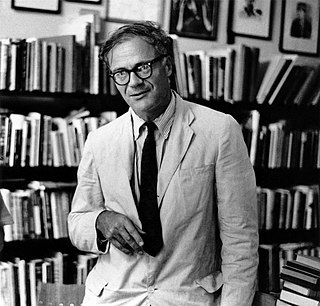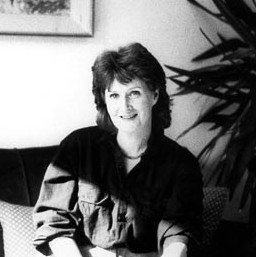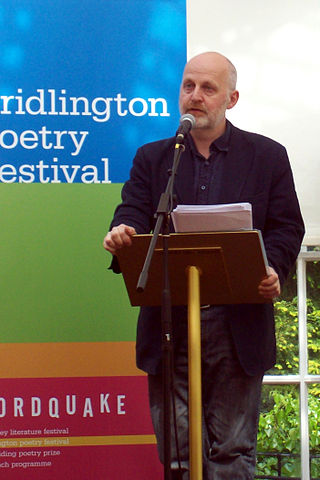
A sonnet is a poetic form that originated in the poetry composed at the Court of the Holy Roman Emperor Frederick II in the Sicilian city of Palermo. The 13th-century poet and notary Giacomo da Lentini is credited with the sonnet's invention, and the Sicilian School of poets who surrounded him then spread the form to the mainland. The earliest sonnets, however, no longer survive in the original Sicilian language, but only after being translated into Tuscan dialect.

Paul Muldoon is an Irish poet. He has published more than thirty collections and won a Pulitzer Prize for Poetry and the T. S. Eliot Prize. At Princeton University he is currently both the Howard G. B. Clark '21 University Professor in the Humanities and Founding Chair of the Lewis Center for the Arts. He held the post of Oxford Professor of Poetry from 1999 to 2004 and has also served as president of the Poetry Society (UK) and Poetry Editor at The New Yorker.

Robert Traill Spence Lowell IV was an American poet. He was born into a Boston Brahmin family that could trace its origins back to the Mayflower. His family, past and present, were important subjects in his poetry. Growing up in Boston also informed his poems, which were frequently set in Boston and the New England region. The literary scholar Paula Hayes believes that Lowell mythologized New England, particularly in his early work.

Eavan Aisling Boland was an Irish poet, author, and professor. She was a professor at Stanford University, where she had taught from 1996. Her work deals with the Irish national identity, and the role of women in Irish history. A number of poems from Boland's poetry career are studied by Irish students who take the Leaving Certificate. She was a recipient of the Lannan Literary Award for Poetry.

Donald Paterson is a Scottish poet, writer and musician. His work has won several awards, including the Forward Poetry Prize, the T. S. Eliot Prize and the Geoffrey Faber Memorial Prize. He was recipient of the Queen's Gold Medal for Poetry 2009.

Macaronic language is any expression using a mixture of languages, particularly bilingual puns or situations in which the languages are otherwise used in the same context. Hybrid words are effectively "internally macaronic." In spoken language, code-switching is using more than one language or dialect within the same conversation.
Ciaran Gerard Carson was a Northern Ireland-born poet and novelist.
Seymour Mayne is a Canadian author, editor, or translator of more than seventy books and monographs. As he has written about the Jewish Canadian poets, his work is recognizable by its emphasis on the human dimension, the translation of the experience of the immigrant and the outsider, the finding of joy in the face of adversity, and the linking with tradition and a strong concern with history in its widest sense.
Maltese literature is any literature originating from Malta or by Maltese writers or literature written in the Maltese language.
Richard Berengarten is an English poet. Having lived in Italy, Greece, the US and the former Yugoslavia, his perspectives as a poet combine English, French, Mediterranean, Jewish, Slavic, American and Oriental influences. His poems explore historical and political material, inner worlds and their archetypal resonances, and relationships and everyday life. His work is marked by its multicultural frames of reference, depth of themes, and variety of forms. In the 1970s, he founded and ran the international Cambridge Poetry Festival. He has been an important presence in contemporary poetry for the past 40 years, and his work has been translated into more than 90 languages.

Harry Clifton is an Irish poet.
Willis Barnstone is an American poet, religious scholar, and translator. He was born in Lewiston, Maine and lives in Oakland, California. He has translated works by Jorge Luis Borges, Antonio Machado, Rainer Maria Rilke, Pedro Salinas, Pablo Neruda, and Wang Wei, as well as the New Testament and fragments by Sappho and pre-Socratic philosopher Heraclitus (Ἡράκλειτος).
Grahame Davies LVO is a poet, author, editor, librettist, literary critic and former journalist. He was brought up in the former coal mining village of Coedpoeth near Wrexham in north east Wales.

Joseph "Joe" Grech, is a Maltese singer, who was born in Cospicua, Malta. He is best known for introducing the Maltese language to the Eurovision Song Contest 1971, the first appearance from Malta on this pan-European television event.

Francisco Xavier Alarcón was a Chicano poet and educator. He was one of the few Chicano poets to have "gained recognition while writing mostly in Spanish" within the United States. His poems have been also translated into Irish and Swedish. He made many guest appearances at public schools so that he could help inspire and influence young people to write their own poetry especially because he felt that children are "natural poets."
Elizabeth Grech is a Maltese writer and translator.
Maria Grech Ganado, considered to be from Floriana, is a Maltese author and academic.
Major poetry related events taking place worldwide during 2022 are outlined below under different sections. These include poetry books released during the year in different languages, major poetry awards, poetry festivals and events, besides anniversaries and deaths of renowned poets etc. Nationality words link to articles with information on the nation's poetry or literature.
Dinah Hawken is a New Zealand poet, creative writing teacher, physiotherapist, counsellor and social worker.









